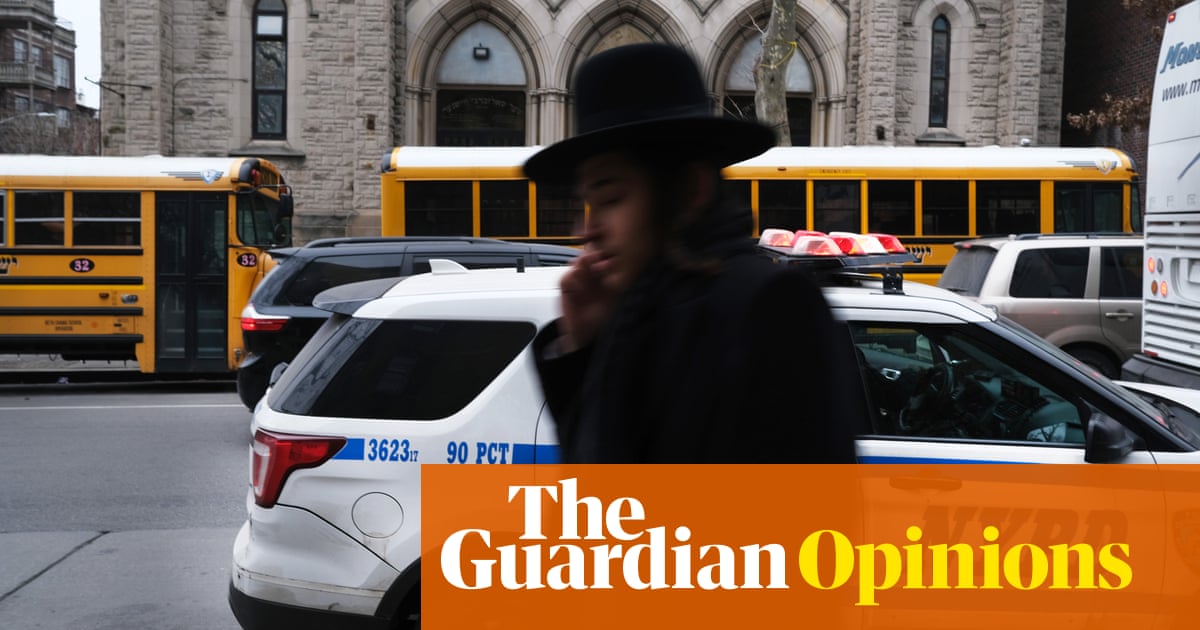The only way to fight antisemitism is solidarity and compassion not division | Joshua Leifer
Hate attacks are proof that antisemitism is alive and well. But fearmongering and regressive policing are not the answer

As the year draws to a close, the air in Brooklyn feels heavy. A spate of antisemitic attacks on Orthodox Jews at least nine in about a week has left many in the boroughs Jewish communities feeling vulnerable and frightened. Another antisemitic attack on Saturday in the largely ultra-Orthodox suburb of Monsey, New York in which a machete-wielding man wounded five people, one of them critically further traumatized communities already reeling. And this comes only weeks after two assailants opened fire on a kosher grocery in Jersey City, killing Mindel Ferencz and Moshe Deutsch, both Hasidic Jews, and Miguel Douglas Rodriguez.
The period beginning with the October 2018 shooting at the Tree of Life Synagogue in Pittsburgh, where 11 Jews were killed as they prayed, has seen antisemitic violence of an unprecedented severity in the United States. But what makes the stabbing in Monsey, the shooting in Jersey City, and many of the attacks in Brooklyn different from the Pittsburgh and Poway, California, synagogue shootings is that the alleged perpetrators were not white supremacists; nor were they white.
Rightwing forces, both within the Jewish community and outside it, have cynically seized on this fact to attribute these attacks to the left or intersectionalism. Yet the alleged perpetrators of many of the recent attacks appear to have acted without any clear or coherent political ideology; furthermore, the right seems to believe the terms black and left are interchangeable.
Even worse, while the calls for a decisive, dramatic response to these attacks are understandable, some of the measures being proposed are a kind of collective punishment of communities of color communities already suffering from racialized over-policing, mass incarceration, extra-judicial state violence, and the same tides of gentrification that are also forcing many ultra-Orthodox Jews to leave the city for cheaper housing in the suburbs.
Following the attacks, the New York City mayor, Bill De Blasio, has pledged to dramatically increase police patrols in both Jewish communities and communities of color. Some Orthodox Jewish politicians are even demanding that New York Governor Andrew Cuomo declare a state of emergency and deploy the National Guard to protect Jewish neighborhoods. Conservative pundits are using the recent antisemitic violence to argue against stricter gun laws and criminal justice reforms like the end of cash bail. On Twitter, there are rumblings about the need for Jews to arm and form militia-style self-defense groups.
These responses epitomize the logic of fracture, which is one of the defining processes of the current political moment. The logic of fracture appears when the pain of victimhood leads to callousness or blindness to or worse, pleasure in the pain of others who are coded as adversaries; their humanity their victimhood, too is obscured by fear and suspicion.
The logic of fracture breaks society into hostile, frightened, mutually suspicious groups and subgroups. It reduces the horizons of empathy, understanding, and solidarity. It turns people who share the same spaces neighborhoods, buildings, buses, trains as well as the same interests affordable housing, clean streets, a living wage into enemies. Its endpoint is a dystopia of embittered, terrified, suffering communities armed against each other, fighting against a backdrop of ever-increasing immiseration.
There is a centripetal quality to fracture. It creates a cycle antagonism, then aggression, then explosion which then repeats, becoming more severe with each repetition.
Practicing progressive solidarity means resisting these impulses. The logic of solidarity is the exact opposite of the logic of fracture. Solidarity requires overcoming differences to find common cause. Thats what makes it powerful as a concept and frightening to those in power, who rule in part by keeping ordinary people divided against one another.
Solidarity is almost never easy. It is often less immediately gratifying. It can feel like being left vulnerable in what already feels like a moment of great vulnerability. But it is required to resist the process of fracture. What will not resist the logic of fracture: deploying heavily militarized police or the National Guard to patrol the streets of Brooklyn; glorifying violence or identitarian machismo; rushing to stock up on assault weapons; or inciting more hatred and suspicion in the press.
The United States is, as anyone who reads the news can feel, deep in a process of fracture. The election of Donald Trump, whose methods of campaigning and governing exemplify the logic of fracture, is both a cause and a symptom. So, too, are the antisemitic attacks that have left Jewish communities in the New York metropolitan area, as well as around the country, feeling defenseless.
The current moment requires leadership from politicians to faith and community leaders to journalists willing to address the root causes of tensions between different racial and religious groups instead of exacerbating them. It requires a wideness of moral vision, a perspective that can recognize, from a place of pain and suffering, the pain and suffering of others. It requires, in other words, more solidarity.
-
Joshua Leifer is an associate editor at Dissent
